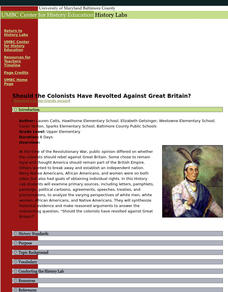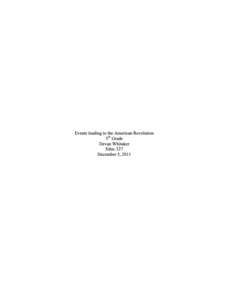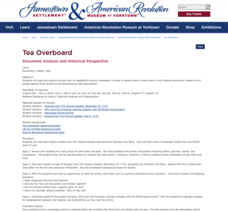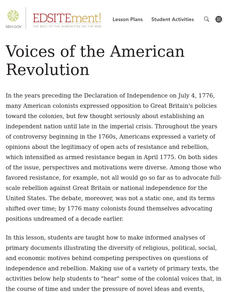Carolina K-12
Causes of the American Revolution
Beginning with the experience of hearing that lockers in school will be taxed, through analysis of political cartoons and informational text, and culminating in a debate between loyalists and patriots, your class members will engage in a...
Los Angeles Unified School District
Why Is the Declaration of Independence Important?
Fair or unfair? To begin a study of the American Revolution, class members review the treatment of the people of the American Colonies by the King of England and decide which were fair and which were unfair. Class members then annotate a...
Curated OER
The American Revolution: 1775 - 1783
Track the ins and outs and wartime strategies used by both the British and the Americans during the Revolutionary War. Multiple comparisons are made between both factions, maps, statistical data, images, and light text is used throughout...
Carolina K-12
Loyalists and Patriots
Your young historians will square off as Loyalists dedicated to the English crown or revolutionaries fighting for a new nation in a role-play of a colonial town hall debate before the American Revolution.
Curated OER
Abigail as Political and Historical Observer
Lesson five in the series asks scholars to examine letters Abigail Adams wrote about her experiences during American Revolutionary War battles, her thoughts on slavery, and her concerns for her husband.
Carolina K-12
Revolutionary War Era Tick-Tack- Toe
So many fantastic activities on the American Revolution! From drawing political cartoons illustrating events of the Boston Massacre to writing a diary entry as a shopkeeper during the Boston Tea Party, your young historians will...
Center for History Education
Should the Colonists Have Revolted Against Great Britain?
Should the Americans have taken the plunge and revolted against Great Britain? Using documents, including the famed Common Sense and a Loyalist response, pupils conduct a lengthy investigation of the question. The interesting resource...
Roy Rosenzweig Center for History and New Media
The Revolutionary Times as Seen Through the Eyes of Women
The role of women before and during the American Revolution changed dramatically. To gain an understanding of these changes, middle schoolers analyze primary source documents, including letters from women that supported the patriot cause...
Pace University
American Revolution
Young historians get hooked into a unit study of the American Revolution with a simulation that lets them experience some of the outrage colonists felt about unfair taxes. Class members demonstrate what they have learned in the study by...
Manchester University
Events leading to the American Revolution
The Stamp Act, Paul Revere's ride, and the Boston Tea Party pushed American colonists to the tipping point that led to the American Revolution. Fifth graders research the key figures of the war, study the Declaration of Independence, and...
Jamestown-Yorktown Foundation
Tea Overboard
While less well known than the event in Boston, the Yorktown Tea Party was equally decisive in turning community sentiment against Great Britain. To gain an understanding of why the colonists objected to the Tea Act, young historians...
Jamestown-Yorktown Foundation
Life of a Private Lesson Plan
In order to understand the challenges the Continental Army faced during the American Revolution, class members analyze primary source materials including a soldier's journal and an officer's letter, and watch a short reenactment video.
Jamestown-Yorktown Foundation
Making a Patriot Inquiry: Are Independence, Freedom, and Liberty the Same Thing?
As part of a study of the American Revolution, class members engage in an inquiry-based lesson that has them watch a scene from the play Slave Spy, examine multiple primary source documents, and then discuss the similarities and...
Jamestown-Yorktown Foundation
Why Did Some Colonial Virginians Continue to Support the King?
Not all colonials supported the American Revolution. A resource from the American Revolution Museum at Yorktown ask young historians to investigate the reasons why some colonial Virginians were loyalist and continued to support King...
North Carolina Consortium for Middle East Studies
Missing Pieces of the Puzzle: African Americans in Revolutionary Times
What's missing from most studies of the American Revolutionary War is information about the role African Americans played in the conflict. To correct this oversight, middle schoolers research groups like the Black Loyalists and Black...
Reading Through History
Patriots and Loyalists
Patriots versus Loyalists, a huge divide during the Revolutionary War in what would become the United States of America. An informative resource includes both direct instruction about the two groups and a quiz pupils take after reading...
K12 Reader
An Independent Nation
If your kids are curious about the American Revolution, help them understand more about its background with a reading passage and comprehension questions. Kids use context clues to answer each question, some of which require more...
Curated OER
To Declare Independence or Not??
Students debate and role play about whether the colonists should declare independence from England or not. In this American history and oral communication lesson plan, students read informational text about the colonists and their...
Curated OER
South Carolina: Loyalist or Patriot?
Eighth graders examine the battle waged in South Carolina over the American Revolution. In this American Revolution lesson, 8th graders analyze primary sources as they determine how the Loyalists and Patriots chose sides in the war.
Curated OER
Understanding Loyalist Vs. Revolutionary Ideology
Students understand some causes of the American Revolution. Students learn the viewpoints of the loyalists and the American Revolutionaries. Students learn a timeline of facts which they use to compare and contrast the views of the...
Curated OER
Heightening Awareness
Students review their prior knowledge about Haiti. They examine violence in Haiti by reading and discussing "HAITIAN FORCES BATTLING UPRISING REPORT RETAKING 3 TOWNS." In groups, students research specific time periods of Haitian history...
National Endowment for the Humanities
Lesson 3: Religion and the Fight for American Independence
Pupils explore the role religion played in the American Revolutionary War. Using primary documents and writing exercises, high schoolers understand how religion was used in support of the war efforts and how specific religious groups...
Curated OER
Voices of the American Revolution - Primary Documents
Students use primary documents to examine the attitudes and positions of several factions leading up to the American Revolutionary War. They read documents, debate differing perspectives and write an essay exploring the reasons for revolt.
Curated OER
Loyalists
Students explain why some colonists remained loyal to England during the American revolution. In this social studies activity, students write a letter to an editor about their reasons for remaining loyal to England.

























